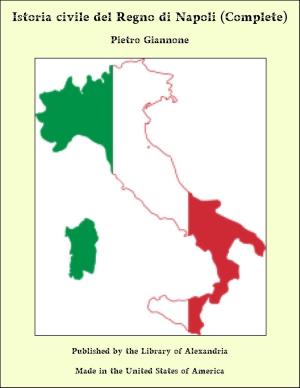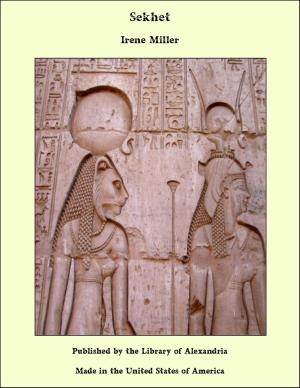Diary in America (Complete)
Nonfiction, Religion & Spirituality, New Age, History, Fiction & Literature| Author: | Frederick Marryat | ISBN: | 9781465548894 |
| Publisher: | Library of Alexandria | Publication: | March 8, 2015 |
| Imprint: | Language: | English |
| Author: | Frederick Marryat |
| ISBN: | 9781465548894 |
| Publisher: | Library of Alexandria |
| Publication: | March 8, 2015 |
| Imprint: | |
| Language: | English |
After many years of travel, during which I had seen men under almost every variety of government, religion, and climate, I looked round to discover if there were not still new combinations under which human nature was to be investigated. I had traversed the old country until satisfied, if not satiated; and I had sailed many a weary thousand miles from west to east, and from north to south, until people, manners, and customs were looked upon by me with indifference. The press was constantly pouring out works upon the new world, so contradictory to each other, and pronounced so unjust by the Americans, that my curiosity was excited. It appeared strange to me that travellers whose works showed evident marks of talent should view the same people through such very different mediums; and that their gleanings should, generally speaking, be of such meagre materials. Was there so little to be remarked about America, its government, its institutions, and the effect which these had upon the people, that the pages of so many writers upon that country should be filled up with how the Americans dined or drank wine, and what description of spoons and forks were used at table? Either the Americans remained purely and unchangedly English, as when they left their father-land; or the question required more investigation and deeper research than travellers in their hasty movements have been able to bestow upon it. Whether I should be capable of throwing any new light upon the subject, I knew not, but at all events I made up my mind that I would visit the country and judge for myself. On my first arrival I perceived little difference between the city of New York and one of our principal provincial towns; and, for its people, not half so much as between the people of Devonshire or Cornwall and those of Middlesex. I had been two or three weeks in that city, and I said: There is certainly not much to write about, nor much more than what has already been continually repeated. No wonder that those who preceded me have indulged in puerilities to swell out their books. But in a short time I altered my opinion: even at New York, the English appearance of the people gradually wore away; my perception of character became more keen, my observance consequently more nice and close, and I found that there was a great deal to reflect upon and investigate, and that America and the American people were indeed an enigma; and I was no longer surprised at the incongruities which were to be detected in those works which had attempted to describe the country. I do not assert that I shall myself succeed, when so many have failed, but at any rate, this I am certain of, my remarks will be based upon a more sure foundation—an analysis of human nature. There are many causes why those who have written upon America have fallen into error: they have represented the Americans as a nation: now they are not yet, nor will they for many years be, in the true sense of the word, a nation—they are a mass of many people cemented together to a certain degree, by a general form of government; but they are in a state of transition, and (what may at first appear strange) no amalgamation as has yet taken place: the puritan of the east, the Dutch descent of the middle states, the cavalier of the south, are nearly as marked and distinct now, as at the first occupation of the country, softened down indeed, but still distinct. Not only are the populations of the various states distinct, but even those of the cities: and it is hardly possible to make a remark which may be considered as general to a country, where the varieties of soil and of climate are so extensive. Even on that point upon which you might most safely venture to generalise, namely, the effect of a democratical form of government upon the mass, your observations must be taken with some exceptions, arising from the climate, manners, and customs, and the means of livelihood so differing in this extended country
After many years of travel, during which I had seen men under almost every variety of government, religion, and climate, I looked round to discover if there were not still new combinations under which human nature was to be investigated. I had traversed the old country until satisfied, if not satiated; and I had sailed many a weary thousand miles from west to east, and from north to south, until people, manners, and customs were looked upon by me with indifference. The press was constantly pouring out works upon the new world, so contradictory to each other, and pronounced so unjust by the Americans, that my curiosity was excited. It appeared strange to me that travellers whose works showed evident marks of talent should view the same people through such very different mediums; and that their gleanings should, generally speaking, be of such meagre materials. Was there so little to be remarked about America, its government, its institutions, and the effect which these had upon the people, that the pages of so many writers upon that country should be filled up with how the Americans dined or drank wine, and what description of spoons and forks were used at table? Either the Americans remained purely and unchangedly English, as when they left their father-land; or the question required more investigation and deeper research than travellers in their hasty movements have been able to bestow upon it. Whether I should be capable of throwing any new light upon the subject, I knew not, but at all events I made up my mind that I would visit the country and judge for myself. On my first arrival I perceived little difference between the city of New York and one of our principal provincial towns; and, for its people, not half so much as between the people of Devonshire or Cornwall and those of Middlesex. I had been two or three weeks in that city, and I said: There is certainly not much to write about, nor much more than what has already been continually repeated. No wonder that those who preceded me have indulged in puerilities to swell out their books. But in a short time I altered my opinion: even at New York, the English appearance of the people gradually wore away; my perception of character became more keen, my observance consequently more nice and close, and I found that there was a great deal to reflect upon and investigate, and that America and the American people were indeed an enigma; and I was no longer surprised at the incongruities which were to be detected in those works which had attempted to describe the country. I do not assert that I shall myself succeed, when so many have failed, but at any rate, this I am certain of, my remarks will be based upon a more sure foundation—an analysis of human nature. There are many causes why those who have written upon America have fallen into error: they have represented the Americans as a nation: now they are not yet, nor will they for many years be, in the true sense of the word, a nation—they are a mass of many people cemented together to a certain degree, by a general form of government; but they are in a state of transition, and (what may at first appear strange) no amalgamation as has yet taken place: the puritan of the east, the Dutch descent of the middle states, the cavalier of the south, are nearly as marked and distinct now, as at the first occupation of the country, softened down indeed, but still distinct. Not only are the populations of the various states distinct, but even those of the cities: and it is hardly possible to make a remark which may be considered as general to a country, where the varieties of soil and of climate are so extensive. Even on that point upon which you might most safely venture to generalise, namely, the effect of a democratical form of government upon the mass, your observations must be taken with some exceptions, arising from the climate, manners, and customs, and the means of livelihood so differing in this extended country















